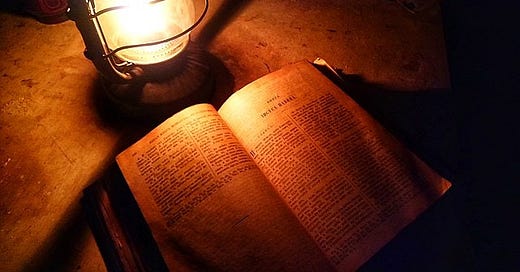Welcome to the Daily Bible Chapter. My name is James Leroy Wilson and I invite you to join me as I attempt to read the Bible with fresh eyes, as if I don't know anything about it. Let's see where this takes us!
I'm reading Young's Literal Translation (YLT) and the New Revised Standard Version (NRSV).
Leviticus 18
First, a note about Molech, mentioned in verse 22 and never mentioned before. I don't know who or what Molech is. I'll wait to see if Molech's mentioned again with some description before I use outside sources to find out. But if the Israelites are tempted to sacrifice children to Molech, I suspect it can't be anything good.
Leviticus 18 helps solidify my position that Genesis 9 was really the beginning of the story. Noah's flood and all things before that are just backstories. One could say the story really begins with Moses, but the necessary prelude is Genesis 9. It establishes the theme.
As I wrote:
Ham, the father of Canaan, "saw the nakedness of his father," I think we are to infer something more, perhaps that Ham mocked Noah or even raped him. Ham then must become a slave to his brothers.
This sounds like a metaphor. There's a side of me that's potentially capable of anything, no matter perverse or gross, but I also have a higher self that subdues such impulses. The Ham in me must be a slave to better versions of me.
Pre-flood, Cain and Lamech could get away with murder; anyone could get away with anything. Maybe they represented my lowest, basest self. Ham now represents my lowest self, but now he's restrained.
In this story, it seems that Shem is my "highest" self that governs Ham, my lowest self. The post-flood era is a new stage of human development.
Egyptians, from whom the Shem-descended Israelites fled, are descendants of Ham. Canaanites, into whose land the Israelites are going, are also descendants of Ham. And, they still do as Ham did.
We can assume from context and common sense that to "uncover someone's nakedness" is to have, or attempt to have, sexaul relations with them.
I've mentioned before that virtually nothing in what we've read so far suggests that these early books of the Bible are anything but mythology. It's like fantasy fiction, and we have no suggestion within the text that it's anything else. Whatever the LORD commands, it is meant for the people spoken to in the story. So none of the rules about unclean animals, bodily emissions, skin diseases, and blood are binding on us. Not even the Ten Commandments. They're all just part of the story.
Leviticus 18 is no different. It's a plot point. It's telling us that what the descendants of Ham, shall not be done by the Israelites. Most of the commands are things most people today would agree with anyway, such as barring sex with family members.
The main point of disagreement is verse 22: "You shall not lie with a male as with a woman; it is an abomination." Those like me who respect people who have a homosexual orientation and honor same-sex relationships, will point to other provisions in Biblical texts, such as rules regarding slavery, to prove the moral absurdity of the Bible.
But… they don't really have a problem with any other verse of this particular chapter. Have you heard anyone say, "Oh, so the Bible says I can't sleep with my sister? Well, the Bible permits slavery, so there!"
In the context of nearby verses regarding sex with menturating women and with animals, and all the previous rules about blood (e.g., Leviticus 17:14), I get the impression that "life-force" bodily fluids like blood and semen are sacred to the LORD, and shouldn't be mixed with the fluids of others.
And it's all part of a story. What is said in a story isn't a commandment for anyone. Morality doesn't doesn't depend on what's written in a book, and especially not what's written in a story. Leviticus 18 is just part of a story.
But, like all good stories, the story of the Israelites has meaning. View Ham as the lower self, a slave to the body, that must be subdued by Shem, the higher spiritual self, and see if we can't just enjoy the story and see what happens next.
James Leroy Wilson writes Daily Miracles, The Daily Bible Chapter, JL Cells, and The MVP Chase. Thanks for your subscriptions and support!



